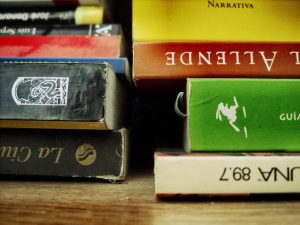As a Spanish speaker, I know that if I don’t use the language I get rusty in it, and as a teacher/linguist, I know that after a certain point, most of a person’s new vocabulary is acquired through reading words in context. So I enjoy reading in Spanish for the fun of it and for how it improves my vocabulary and skills. I have to admit, though, my choices have been guided more by what’s available on Barnes & Noble’s very limited Spanish shelf and less by knowledgeable recommendations.

That’s why I was excited to see that a few years ago a blog called in lieu of a field guide featured a list of the “best Spanish language novels of the last 25 years.” I have to be transparent about my lack of expertise here, though – I was surprised in several ways. First, on a note of personal opinion, I would not agree with Cólera as the number 1 pick. I couldn’t get a third of the way through it and Márquez’s portrayal of “love” in it disgusts me. I find the story awkward and sad and a tragic distortion of truth. I enjoyed Doce cuentos peregrinos much more and particularly like Noticia de un secuestro. His autobiography Vivir para contarla bored and confused me with its disorganization and Márquez’s characteristic use of Colombian-specific vocabulary.
I was surprised that there were no Allende novels on the list. I haven’t read Casa de los espiritus but I know it’s received so much acclaim I would have expected to see it. I’ve loved Zorro and Inés del alma mía (which we have used in AP as we talk about the conquest and its effects on the culture today).
Also, it seems like with the prevalence of Roberto Bolaño on the list that I should really know who he is, but I don’t. (Indeed, Márquez and Vargas Llosa were the only names I recognized at all.) So it certainly left me with a resolution to remedy that. If you know him, which should I read first?
Here’s the whole list. Anything you disagree with? What would you add? What should I add to my reading list (which is way too extensive right now, haha)?
- El amor en los tiempos del cólera by Gabriel García Márquez
- La fiesta del Chivo by Mario Vargas Llosa
- Los detectives salvajes by Roberto Bolaño
- 2666 by Roberto Bolaño
- Noticias del imperio by Fernando del Paso
- Corazón tan blanco by Javier Marías
- Bartleby y Compañía by Enrique Vila-Matas
- Santa Evita by Tomás Eloy Martínez
- Mañana en la batalla piensa en mí by Javier Marías
- El desbarrancadero by Fernando Vallejo
- La virgen de los sicarios by Fernando Vallejo
- El entenado by Juan José Saer
- Soldados de Salamina by Javier Cercas
- Estrella distante by Roberto Bolaño
- Paisaje después de la batalla by Juan Goytisolo
- La ciudad de los prodigios by Eduardo Mendoza
- El jinete polaco by Antonio Muñoz Molina
- El testigo by Juan Villoro
- Salón de belleza by Mario Bellatin
- Cuando ya no importe by Juan Carlos Onetti
- La tejedora de coronas by Germán Espinosa
- El paraíso en la otra esquina by Mario Vargas Llosa
- Cae la noche tropical by Manuel Puig
- Doctor Pasavento by Enrique Vila-Matas
- Herrumbrosas lanzas by Juan Benet
6 Comments
Comments are closed.




Wow, not a single female. I *have* heard of Bolaño, especially 2666, that it’s amazing, but the professor recommending it favors the pretentious. As for Allende, I had a less pretentious *female* professor who gagged at the mere mention of Allende, insisting she was just a ripoff of Marquez (que en paz descanse). For me, though, I wish I’d seen some Laura Restrepo–Demasiados Héroes or La Novia Oscura, in particular.
En serio, ¡¿dónde están las mujeres en la lista?! ¿Dónde está Elena Poniatowska que acabe de recibir un premio de Cervantes?
Acabo de hacerle la pregunta al bloguero, a ver si tenga respuesta.
Nubosidad Variable, Carmen Martín Gaite
Nada en serio, pero me encantan las novelas de Maria Duena. Acabo de leer El tiempo entre costuras- muy buena onda.
Iba yo a decir lo mismo que Ivona y Laura. Cabe mencionar a Julia Alvarez, Sandra Cisneros, y la española Dulce Chacón (La voz dormida es una novela conmovedora sobre mujeres presas en una cárcel madrileña después de la Guerra Civil.
También me sorprende no ver al autor catalán Juan Marsé en la lista: ganó el Premio Cervantes en 2008 y es uno de mis escritores favoritos de todos los tiempos; de hecho, escribí mi tesis sobre él.
Pero la verdad es que para una bibliófila que aprecia la buena literatura, es difícil reducir las experiencias de lectura a una lista así. Hay muchas novelas que te enseñan algo nuevo, que cambian tu punto de vista, que te llevan a un mundo nuevo. Y hay muchas que me han afectado así, pero llevan más de 25 años.